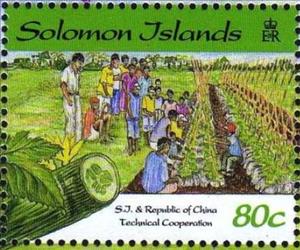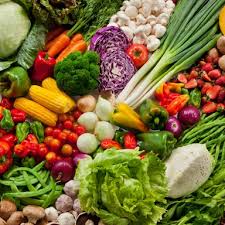Stamp: Growing cucumbers (Solomon Islands 1998)
Growing cucumbers (Solomon Islands 1998)
29 May (Solomon Islands ) within release Cooperation between Solomon Islands and Taiwan goes into circulation Stamp Growing cucumbers face value 80 Solomon Islands cent
| Stamp Growing cucumbers in catalogues | |
|---|---|
| Michel: | Mi: SB 969 |
| Stamp Number: | Sn: SB 870a |
Stamp is square format.
Also in the issue Cooperation between Solomon Islands and Taiwan:
- Stamp - Harvesting rice face value 1.50;
- Souvenir Sheet - Cucumbers and tomatoes face value 2;
- Stamp - Water melon and cultivation face value 50;
- Stamp - Growing tomatoes face value 1.20;
- Stamp - Growing cucumbers face value 80;
Stamp Growing cucumbers it reflects the thematic directions:
Agriculture is the cultivation and breeding of animals, plants and fungi for food, fiber, biofuel, medicinal plants and other products used to sustain and enhance human life.[1] Agriculture was the key development in the rise of sedentary human civilization, whereby farming of domesticated species created food surpluses that nurtured the development of civilization. The study of agriculture is known as agricultural science. The history of agriculture dates back thousands of years, and its development has been driven and defined by greatly different climates, cultures, and technologies. Industrial agriculture based on large-scale monoculture farming has become the dominant agricultural methodology.
In botany, a fruit is the seed-bearing structure in flowering plants (also known as angiosperms) formed from the ovary after flowering. Fruits are the means by which angiosperms disseminate seeds. Edible fruits, in particular, have propagated with the movements of humans and animals in a symbiotic relationship as a means for seed dispersal and nutrition; in fact, humans and many animals have become dependent on fruits as a source of food. Accordingly, fruits account for a substantial fraction of the world's agricultural output, and some (such as the apple and the pomegranate) have acquired extensive cultural and symbolic meanings. In common language usage, "fruit" normally means the fleshy seed-associated structures of a plant that are sweet or sour, and edible in the raw state, such as apples, bananas, grapes, lemons, oranges, and strawberries. On the other hand, in botanical usage, "fruit" includes many structures that are not commonly called "fruits", such as bean pods, corn kernels, tomatoes, and wheat grains. The section of a fungus that produces spores is also called a fruiting body.
A people is a plurality of persons considered as a whole, as is the case with an ethnic group or nation. Collectively, for example, the contemporary Frisians and Danes are two related Germanic peoples, while various Middle Eastern ethnic groups are often linguistically categorized as Semitic peoples.
Vegetables are parts of plants that are consumed by humans or other animals as food. The original meaning is still commonly used and is applied to plants collectively to refer to all edible plant matter, including the flowers, fruits, stems, leaves, roots, and seeds. An alternative definition of the term is applied somewhat arbitrarily, often by culinary and cultural tradition. It may exclude foods derived from some plants that are fruits, flowers, nuts, and cereal grains, but include savoury fruits such as tomatoes and courgettes, flowers such as broccoli, and seeds such as pulses.




